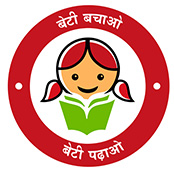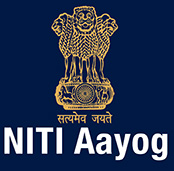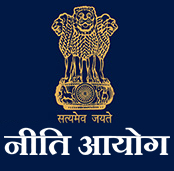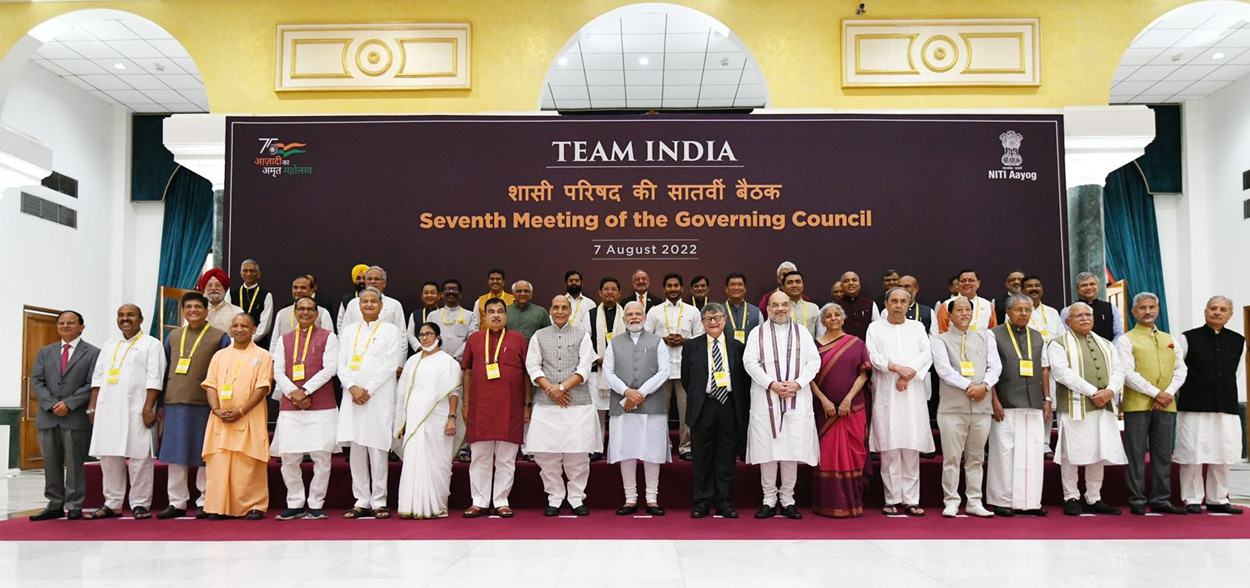NITI Aayog was formed via a resolution of the Union Cabinet on 1 January 2015. The Governing Council of NITI Aayog, comprising Chief Ministers of all the States and Union Territories with legislatures and Lt Governors of other Union Territories, came into effect on 16 February 2015 via a notification by the Cabinet Secretariat. The Governing Council was reconstituted vide a notification dated 19 February 2021 by the Cabinet Secretariat.
The Governing Council is the premier body tasked with evolving a shared vision of national priorities and strategies, with the active involvement of States, in shaping the development narrative. The Governing Council, which embodies the objectives of cooperative federalism, presents a platform to discuss inter-sectoral, inter-departmental and federal issues to accelerate the implementation of the national development agenda.
So far, seven meetings of the Governing Council have been held under the chairmanship of the Hon'ble Prime Minister with Chief Ministers/Lt Governors of the States/UTs and other members of the Governing Council.
- Tenth Meeting: 24 May 2025

Prime Minister Shri Narendra Modi chaired the 10th Governing Council Meeting of NITI Aayog at Bharat Mandapam, New Delhi, earlier today. It was attended by Chief Ministers and Lt. Governors representing 24 States and 7 UTs. This year’s theme was Viksit Rajya for Viksit Bharat@2047. The meeting commenced with a minute of silence in the remembrance of the victims of Pahalgam terrorist attack.
Prime Minister said that it is the aspiration of every Indian for the country to be a Viksit Bharat. It is not the agenda of any party but the aspiration of 140 crore Indians. He observed that if all States work together towards this goal, then we will make stupendous progress. He also said that we should commit that every State, every city, every village will be developed, and then Viksit Bharat will be achieved much before 2047.
PM said that India has emerged among top five economies of the world and 25 crore have escaped poverty. He emphasised that India needs to increase the speed of this transformation. He encouraged States to leverage their manufacturing strengths. He said that the Government of India has announced the Manufacturing Mission.
PM observed that Global investors are hugely interested in India. He encouraged the States to utilise this opportunity and make it easy for investments. Citing recent trade agreements with UAE, UK and Australia, he said States should utilise it to the optimum.
Emphasizing on skilling, Prime Minister said that NEP gives emphasis on Education and Skill. He said States must plan for various skills which are attuned to modern technologies like AI, Semiconductor, 3D printing. He said that we can become the Skill Capital of the world because of our demographic dividend. Prime Minister said that a Rs 60,000 crore scheme for skilling has been approved by GoI. States must focus on modern training infrastructure and rural training hubs to enhance Skilling.
PM cited cyber security as a challenge as well as an opportunity. Hydrogen and Green Energy were emphasised by him as arenas of immense potential and opportunities.
- Ninth Meeting: 27 July 2024
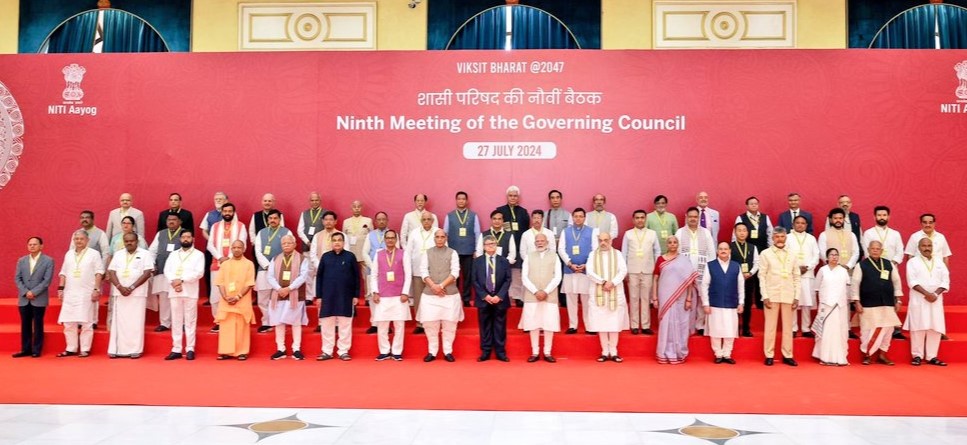
Prime Minister Shri Narendra Modi chaired the 9th Governing Council Meeting of NITI Aayog earlier today. The Meeting was held at the Rashtrapati Bhavan Cultural Centre, New Delhi. It was attended by Chief Ministers/Lt.Governors representing 20 States and 6 UTs.
Prime Minister emphasised on cooperation and collective effort of all States and the Centre to work together in order to achieve the vision of Viksit Bharat @2047.
Prime Minister observed that India has achieved steady growth in the past ten years. Indian economy, which was ranked 10th largest economy in the world in 2014, has risen to become the 5th largest economy by 2024. He added that now the collective aim of the government and all citizens is to become the third largest economy in the world.
Prime Minister stressed that our country has already made a lot of progress in the past ten years by strengthening social and economic infrastructure. From being a predominantly import-driven country, India now exports many products to the world. The country has made its mark on the world stage in wide ranging sectors like defence, space, start-ups and sports. He appreciated the confidence and enthusiasm of 140 crore citizens, which is the driving force behind the progress of our country.
Prime Minister said that this is the decade of change which brings a lot of opportunities across sectors. He encouraged States to utilise these opportunities and make policies and initiate governance programmes that are conducive for development through innovative approaches in policy making and execution.
He observed that the vision of Viksit Bharat can be realized through Viksit States, and that the aspiration of Viksit Bharat should reach the grassroot level i.e. to each district, block, and village. For this, each State and District should create a vision for 2047 so as to realise Viksit Bharat @ 2047.
Prime Minister appreciated the Aspirational Districts Programme anchored by NITI Aayog, and observed that the key to its success was continuous and online monitoring of measurable parameters, which led to healthy competition among districts to better their performance in different government schemes.
Prime Minister emphasised skilling and training of youth to make them employment ready as the world looks favorably towards India for skilled human resource.
He encouraged States to provide an investor-friendly environment. He directed NITI Aayog to prepare an ‘Investment-friendly Charter’ of parameters which would include policies, programmes and processes to be put in place for attracting investments. The States may be monitored on the achievement in these parameters to promote healthy competition among them for attracting investments. He also underscored the importance of law and order, good governance and infrastructure as vital for attracting investments, rather than just incentives.
Prime Minister encouraged the creation of River Grids at State level for effective utilization of water resources.
He suggested that we must target Zero Poverty as a priority for a Viksit Bharat. He emphasized that we need to tackle poverty on an individual basis rather than just at a programme level. He observed that removing poverty from the grassroots would bring about a transformational effect in our country.
Prime Minister encouraged all States to increase productivity and diversification in agriculture and provide market linkages to farmers. He further emphasised on spreading the adoption of Natural Farming practices which can improve soil fertility, ensure better and quicker returns to farmers due to low costs, and also provide a global market for the products.
Prime Minister encouraged States to initiate Demographic Management Plans to address the issues of population ageing in future.
Prime Minister asked the States to take up capacity building of government officials at all levels and encouraged them to collaborate with the Capacity Building Commission for the same.
Chief Minister/Lt. Governors gave various suggestions for the vision of Viksit Bharat @ 2047 and also discussed steps being taken in their States. Some of the key suggestions and best practices highlighted were in the field of agriculture, education and skill development, entrepreneurship, drinking water, reducing compliances, governance, digitalisation, women empowerment, cyber security, etc. Several States also shared their endeavours to create a State Vision for 2047.
Prime Minister directed NITI Aayog to study the suggestions of States and UTs made during the meeting.
He expressed his gratitude to all the CMs and LGs for participating in the meeting and sharing their views and experiences, and expressed confidence that India is progressing on the path to fulfil the vision of Viksit Bharat @2047 through the power of cooperative federalism.
- Eight Meeting: 27 May 2023

Prime Minister Shri Narendra Modi chaired the 8th Governing Council Meeting of NITI Aayog earlier today. The Meeting was held at the New Convention Centre, Pragati Maidan, New Delhi. It was attended by Chief Ministers/Lt.Governors representing 19 States and 6 UTs.
Prime Minister stressed that the Centre, States and UTs should work as Team India and fulfil the dreams and aspirations of people for a Viksit Bharat @ 2047. He said that NITI Aayog can play a critical role in helping States to develop their strategies for the next 25 years and align the same with the National Development Agenda. He urged the States and UTs to work with NITI Aayog so that the country can take a quantum leap towards achieving its vision for the Amrit Kaal.
Prime Minister mentioned that NITI Aayog is taking multiple initiatives for strengthening cooperative and competitive federalism like the Aspirational Districts Programme (ADP) and Aspirational Blocks Programme (ABP). Both these programmes showcase the power of working together as Centre, States and Districts, and the impact of data-driven governance in improving the lives of common citizens at the grassroots level.
Prime Minister stressed on the need for States and Centre to promote Shree Anna in the International Year of Millets. He also deliberated on the need for working towards water conservation through the Amrit Sarovar programme.
Prime Minister spoke about the importance of maintaining fiscal discipline at the State levels. He urged the States to proactively use the Gati Shakti Portal not only for infrastructure and logistics but also for local area development and creation of social infrastructure.
Prime Minister spoke about the importance of maintaining fiscal discipline at the State levels. He urged the States to proactively use the Gati Shakti Portal not only for infrastructure and logistics but also for local area development and creation of social infrastructure.
Prime Minister also spoke about the importance of skilling people with a view to meet global requirements, supporting MSMEs, developing the tourism potential of the country, reducing compliances at the State level including decriminalisation of minor offences, creation of Ekta Malls. Talking about Nari Shakti, he highlighted the significance of women-led development. He also spoke about ending the menace of TB by 2025.
Chief Minister/Lt. Governors gave various policy level suggestions. They mentioned specific issues pertaining to the States which require Centre-State cooperation. Some of the key suggestions and best practices highlighted by them included in areas like opting for green strategies, need for zone wise planning, tourism, urban planning, agriculture, quality of workmanship, logistics, among others.
Prime Minister expressed his gratitude to the CMs and LGs for participating in the meeting and sharing their views and experiences. He said NITI Aayog will study the states’ concerns, challenges, and best practices and subsequently plan the way forward.
- Seventh Meeting: 7 August 2022
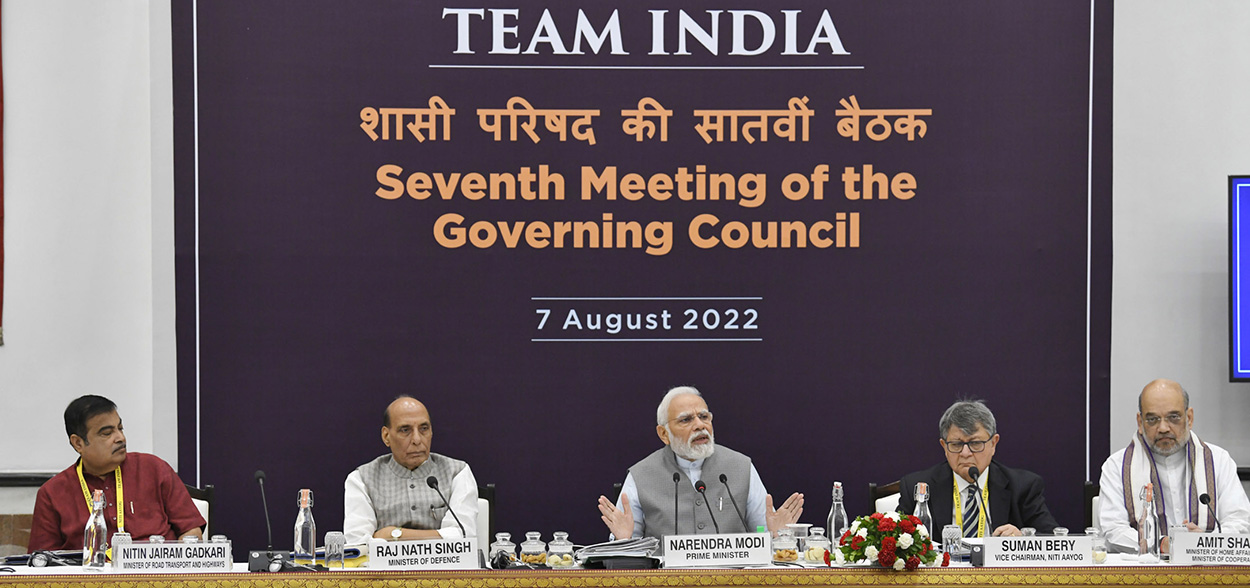
The Prime Minister, Shri Narendra Modi, heralded the collective efforts of all the States in the spirit of cooperative federalism as the force that helped India emerge from the Covid pandemic.
Addressing the seventh meeting of the Governing Council (GC) of NITI Aayog, the Prime Minister said, “Every State played a crucial role according to its strength and contributed to India’s fight against Covid. This led to India emerging as an example for the developing nations to look up to as a global leader.”
This was the first physical meeting of the Governing Council since the onset of the pandemic, with the 2021 meeting held via video conferencing. The meeting was attended by 23 Chief Ministers, 3 Lieutenant Governors and 2 Administrators and Union Ministers. The meeting was moderated by Defence Minister Shri Rajnath Singh.
In his inaugural address, the Prime Minister said India’s federal structure and cooperative federalism emerged as a model for the world during the Covid crisis. He said that India had sent a powerful message to the developing nations of the world—that it is possible to overcome challenges with resilience despite resource limitations. The PM said that the credit for this goes to the State Governments, which focused on grassroots delivery of public services to the people through cooperation across political lines.
The Prime Minister highlighted that the seventh meeting was a culmination of months of rigorous brainstorming and consultations between the Centre and States to identify national priorities. “All Chief Secretaries met together in Dharamshala and over three days, deliberated issues of national importance. This collective process led to the development of the agenda for this meeting," the PM said.
This year, the Governing Council discussed four key agenda items:
-
Crop diversification and achieving self-sufficiency in pulses, oilseeds and other agri-commodities;
-
Implementation of National Education Policy (NEP) in school education;
-
Implementation of National Education Policy in higher education; and
-
Urban governance.
The Prime Minister highlighted the importance of all of the above issues, especially the need for India to focus on modernized agriculture, animal husbandry, and food processing to become self-sufficient and a global leader in the agriculture sector. He said rapid urbanization can become India’s strength instead of weakness by leveraging technology to ensure ease of living, transparent service delivery, and improvement in the quality of life for every citizen of urban India.
The PM also spoke about India’s G20 presidency in 2023 and called it a unique opportunity to show the world that India is not just Delhi—it is every State and Union Territory of the country. The PM said we should develop a mass movement around G20. This will allow us to identify the best talent available in the country. He also said there should be a dedicated team for G20 in the States to derive the maximum possible benefit from this initiative. Speaking about this, the Union Minister of External Affairs, Shri S. Jaishankar, said, “The G20 Presidency presents a great opportunity and a great responsibility. For the first time in the history of G20, India will host the G20 meetings over the year, not only in Delhi, but in every State and Union Territory.”
While highlighting several initiatives undertaken to boost learning outcomes, capacity-building of teachers, and skilling, Union Minister of Education, Shri Dharmendra Pradhan, thanked and requested further support of the States for the successful implementation of the National Education Policy.
Vice Chairman, NITI Aayog, Shri SumanBery, reiterated that India’s transformation has to take place in its states. He reaffirmed the need for the combined efforts of the Centre and States to realize the vision of a resurgent India post the pandemic.
Every Chief Minister and Lt Governor present at the meeting addressed the meeting, highlighting the priorities, achievements, and challenges of their respective States and Union Territories with a special focus on the four key agenda items.
In his closing remarks, the Prime Minister said that each state should focus on promoting its 3Ts, Trade, Tourism, Technology, through every Indian Mission around the world. He said the States must focus on reducing imports, increasing exports and identifying opportunities for the same in every state. “We should encourage people to use local goods wherever possible,” he said. ‘Vocal for local’ is not the agenda of an individual political party but a common goal, he said.
The PM said even though GST collection has improved, our potential is much more. “Increasing GST collection requires collective action by the Centre and States. It is crucial for strengthening our economic position and becoming a USD 5 trillion economy,” he said. Speaking on the National Education Policy, the PM said the NEP has been formulated after considerable deliberations. He said we should involve all stakeholders in its implementation and develop a clear, timebound roadmap for the same.
He expressed his gratitude to the CMs and LGs for participating in the meeting and sharing their views and experiences. He said NITI Aayog will study the states’ concerns, challenges, and best practices and subsequently plan the way forward. He said the issues discussed in this meeting will define the national priorities for the next 25 years, adding that the seeds we sow today will define the fruits reaped by India in 2047.
The Principal Secretary to the PM, NITI Aayog Vice Chairman, Members and CEO, the Cabinet Secretary, Secretaries (DoPT, Culture, DoSE&L, Higher Education &MoHUA), Chief Secretaries of States and Union Territories, and other senior officers from the PMO, Cabinet Secretariat, NITI Aayog attended the seventh meeting.
-
- Sixth Meeting: 20 February 2021
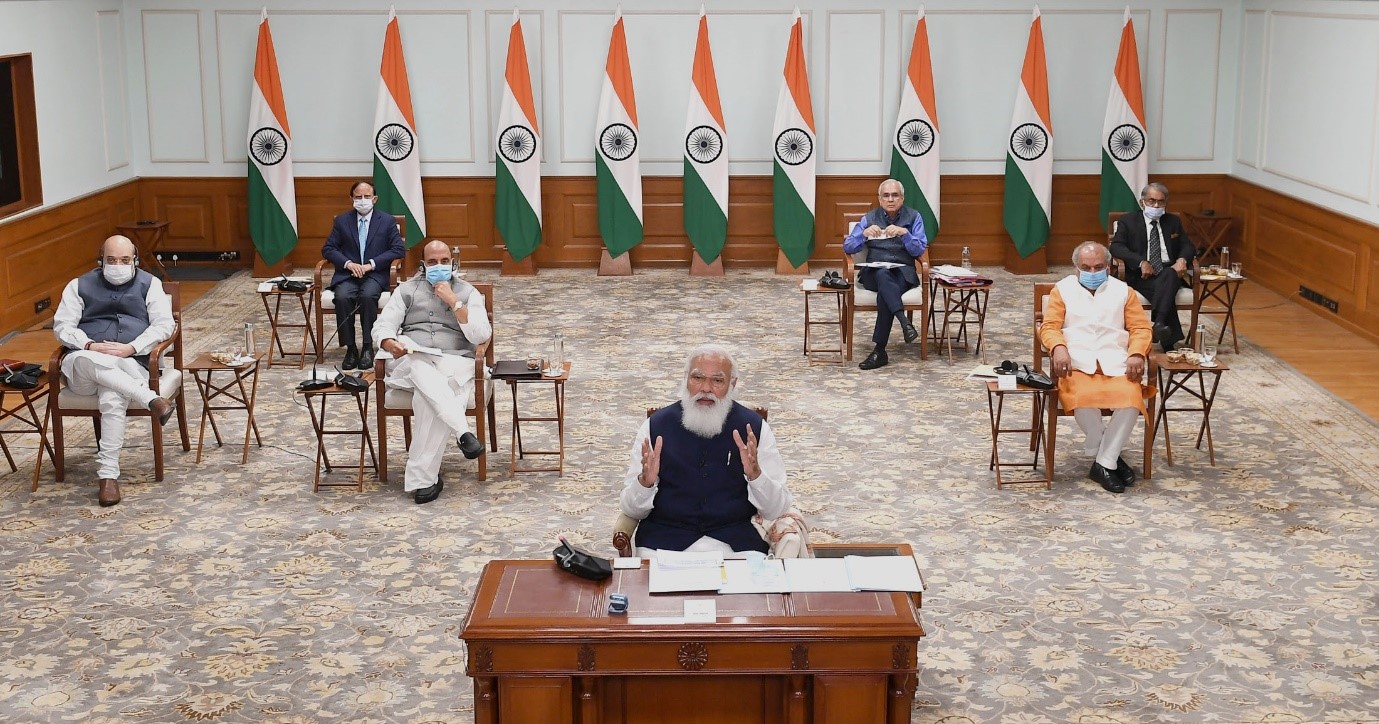
The sixth meeting of the Governing Council of NITI Aayog was held on 20 February 2021 under the chairmanship of Hon’ble Prime Minister Shri Narendra Modi via video conferencing. It was attended by 26 Chief Ministers, 3 Lieutenant Governors and 2 Administrators, apart from Union Ministers who are Ex-Officio Members, and Special Invitees. NITI Aayog’s Vice Chairman, Members and CEO; Principal Secretary to the PM and other senior officers from PMO; Cabinet Secretary; and Chief Secretaries of States/Union Territories also attended the meeting. Raksha Mantri Shri Rajnath Singh moderated the meeting.
The Hon’ble Prime Minister highlighted that cooperative federalism is the foundation of India’s progress. Cooperative and competitive federalism should be made more effective and taken to the district level. The country has succeeded in managing the challenges posed by the Covid-19 pandemic only because the Centre and the States have worked together in a spirit of partnership.
The Hon’ble Prime Minister emphasized the significance of the Governing Council meeting in providing an opportunity to brainstorm and further strengthen cooperative and competitive federalism.
The sixth meeting was preceded by a detailed interaction with senior State officials on 6 February 2021, the feedback for which was duly incorporated while curating the agenda of the meeting. The agenda comprised the following items:
-
Making India a Manufacturing Powerhouse
-
Reimagining Agriculture
-
Improving Physical Infrastructure
-
Accelerating Human Resources Development
-
Improving Service Delivery at Grassroots Level
-
Health and Nutrition
The Council deliberated on several steps for making India a manufacturing powerhouse, such as reducing compliance burden, initiating reforms at the State level, improving logistics, promoting exports through district-level competition, and creating jobs. States/UTs mentioned efforts made to improve water accessibility, supply of quality and reliable power, internet connectivity and bandwidth availability, quality healthcare services, and sustainable agricultural practices to mitigate the risks of climate change. They also mentioned undertaking suitable reforms to build an advanced manufacturing and innovation ecosystem, thereby bolstering exports through the One District One Product initiative, apart from building on futuristic tech and inclusive governance models. The Chief Ministers also noted marked improvement in the development of physical infrastructure, including digital connectivity, across the North-Eastern region, along with a greater thrust on the Act East Policy, with the aim of providing impetus to the economies of the NE states.
Keeping in mind the aspirations of a young country like India, the Hon’ble Prime Minister stressed on the need to build modern infrastructure. Innovation must be encouraged, and more technology should be used to provide better opportunities for education and skill development.
The Governing Council meeting seeks to build on the strength of every state so that everyone can learn from each other’s best practices. The Council members deliberated on strengthening institutions for skilling, reskilling, and upskilling of workforce. Focus was also laid on improving service delivery at the grassroots level, by ensuring digital infrastructure for the rural regions.
The Hon’ble Prime Minister emphasized on policy frameworks and better coordination between the Centre and States. He welcomed the rich discussion and constructive suggestions by the Council members.
The Governing Council meeting paved the way for synergies across all tiers of the Government, with substantial collaboration and cooperation in the agenda items. The meeting provided an opportunity to address the objectives of advancing economic, social, and demographic welfare.
-
- Fifth Meeting: 15 June 2019
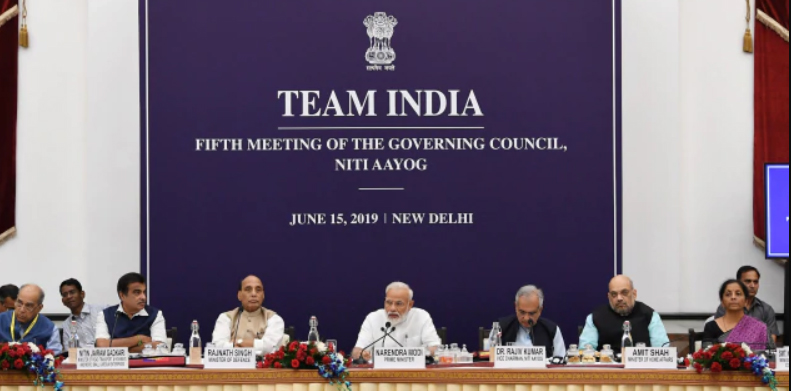
The fifth meeting of the Governing Council of NITI Aayog was held under the chairmanship of Hon'ble Prime Minister of India, Shri Narendra Modi, at the Rashtrapati Bhavan on 15 June 2019. It was attended by the Governor of Jammu and Kashmir, 26 Chief Ministers and the Lieutenant Governor of Andaman and Nicobar Islands, apart from Union Ministers, who are ex-officio members and special invitees. NITI Aayog Vice Chairman, Members, CEO and senior officers also attended the meeting.
The Hon'ble Prime Minister highlighted the importance of the Governing Council of NITI Aayog as a platform to inspire cooperative federalism, stressing on the need to collectively combat poverty, unemployment, drought, pollution, pockets of under-development and all such factors that constrain India’s progress. He emphasized that the goal is to realize the potential of this great country, to create a New India by 2022 and a five-trillion-dollar economy by 2024.
The Hon'ble Prime Minister emphasized on the need for every State to focus on increasing its share in the country’s GDP by evaluating its export potential and determining the steps necessary for increasing exports and boosting employment.
Welcoming the constructive discussion and suggestions made by various Chief Ministers, the Hon'ble Prime Minister assured the Council that these suggestions would be seriously considered in the course of decision-making. On the Agenda before the Fifth Council Meeting were the following items:
-
Rainwater Harvesting
-
Drought Situation and Relief Measures
-
Aspirational Districts Programme: Achievements and Challenges
-
Transforming Agriculture: Need for Structural Reforms with Special Emphasis on:
-
Agriculture Produce Marketing Committee (APMC) Act
-
Essential Commodities Act (ECA)
-
-
Security-Related Issues, with Specific Focus on Left-Wing-Extremism-Affected Districts
The Hon'ble Prime Minister appreciated the efforts of the States towards water conservation and urged all the States to streamline and implement innovative water-management measures. He said the creation of the Ministry of Jal Shakti is a key step by the Union Government to develop an integrated and holistic perspective on water as a developmental resource.
The Hon'ble Prime Minister announced the creation of a high-powered committee on structural reforms in agriculture. He further said that global circumstances currently offer a unique opportunity to India. He said India is establishing itself on global benchmarks such as Ease-of-Doing Business.
The Hon'ble Prime Minister reiterated that the Union Government is keen to partner with the States, and work together for India's development.
-
- Fourth Meeting: 17 June 2018
-
The fourth meeting of the Governing Council of NITI Aayog was held on 17 June 2018 at Rashtrapati Bhavan. The Council held discussions on:
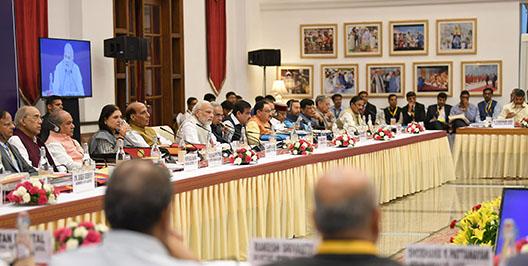
-
Measures taken to double farmers’ incomes, which include:
-
e-National Agriculture Market
-
Soil Health Cards
-
Rural/Agricultural Haat/Gramin Agricultural Markets (GrAM)
-
MGNREGs and its contribution towards water conservation
-
-
Progress made under the flagship schemes of the Government:
-
Ayushman Bharat
-
POSHAN Abhiyaan
-
Mission Indradhanush
-
-
Steps taken to address the developmental needs of specially identified districts under the Aspirational Districts Programme
-
Suggestions received for the celebration of the 150th birth anniversary of Mahatma Gandhi in 2019
At the end of the day-long deliberations, the Hon'ble Prime Minister highlighted the importance of the Governing Council of NITI Aayog as a platform to inspire cooperative federalism, stressing the need for effective center–state cooperation to advance developmental outcomes and achieve double-digit growth for India. He called upon States to fix growth targets for their economies. He advised the States to pay special attention on expanding their exports and attracting export-oriented investment while organizing their investments summits and events. The Hon'ble Prime Minister also called upon the Chief Ministers of Madhya Pradesh, Bihar, Sikkim, Gujarat, Uttar Pradesh, West Bengal and Andhra Pradesh to work together to make recommendations on a coordinated policy approach on the subject of ‘Agriculture and MNREGA’. He also encouraged States to increase corporate investment in agriculture, such as in food processing, warehousing and logistics He reiterated the Union Government's commitment to provide 100% coverage of seven flagship schemes to 45,000 additional villages and those in the 115 Aspirational Districts by 15 August 2018. He urged the States to identify the 'aspirational blocks’ to take development to the grassroots.
-
- Third Meeting: 23 April 2017
-
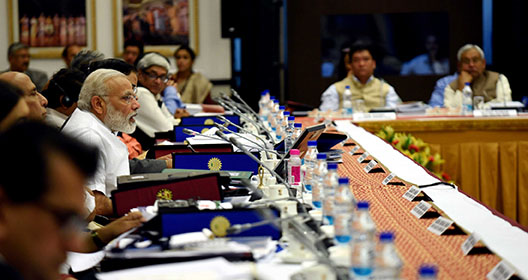
The third meeting of the Governing Council was held on 23 April 2017 at the RBCC, President's Secretariat, New Delhi. Vice Chairman, NITI Aayog, made a presentation on a 15-year vision, accompanied by a 7-year strategy and a 3-year action agenda. He gave an outline of the draft Action Agenda circulated at the meeting, which had been prepared with inputs from the States. CEO, NITI Aayog, made a presentation on the Action-Taken Report and initiatives of NITI Aayog, and the Revenue Secretary made a presentation on GST, explaining the benefits of the system and the way forward. Madhya Pradesh Chief Minister Shri Shivraj Singh Chouhan made a presentation on doubling farmers’ income, touching upon areas such as irrigation, technology generation and dissemination, policy and market reforms, e-NAM, livestock productivity etc. The Hon'ble Prime Minister, in his address, touched upon various issues relating to regional imbalance; use of the GeM platform by the States to reduce corruption and increase transparency in Government procurement; preparation of a roadmap for better utilization of funds like the District Mineral Fund and the CAMPA Fund by the States; etc.
- Second meeting: 15 July 2015
-
The second meeting of the Governing Council of NITI Aayog was held on 15 July 2015. The Hon'ble Prime Minister reiterated the vision of his Government—that state units should be the focus of all development efforts, as part of 'Team India'. The Council held consultations on the Right to Fair Compensation and Transparency in Land Acquisition, Rehabilitation and Resettlement Act. In his opening remarks at the meeting, the Hon'ble Prime Minister said that the Centre and States must move together to end poverty. He said the political deadlock over land acquisition was seriously impacting rural development, including the creation of schools, hospitals, roads and irrigation projects. He appealed to everyone that political considerations should not come in the way of a solution that would facilitate development of the rural areas, and greater prosperity for the farmers.
- First Meeting: 8 February 2015
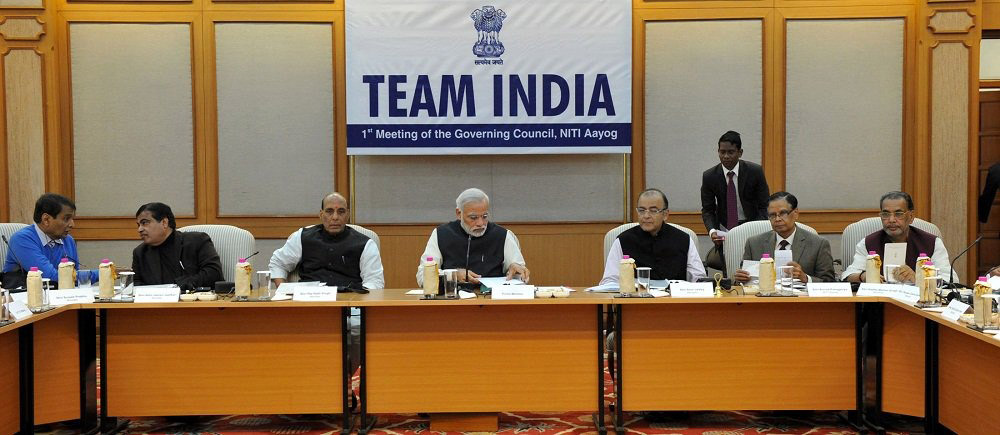
The first meeting of the Governing Council of the NITI Aayog was held on 8 February 2015. The Hon’ble Prime Minister urged all Chief Ministers to work with the Centre to forge a model of cooperative federalism, whereby the Centre and the States could come together to resolve differences, and chart a common course to progress and prosperity. In the spirit of cooperative federalism, therefore, the Governing Council decided that NITI Aayog would constitute three major subgroups of Chief Ministers on:
In addition, it was also decided that the States will set up two taskforces under the leadership of NITI Aayog on:
-
Agriculture Development
-
Poverty Elimination
The reports of all the subgroups have been submitted by NITI Aayog to the Prime Minister's Office.
-
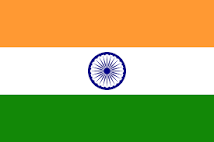 National Portal Of India
National Portal Of India 